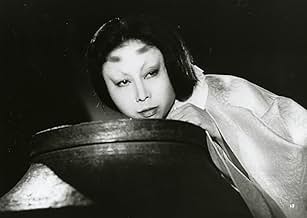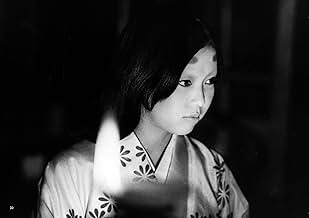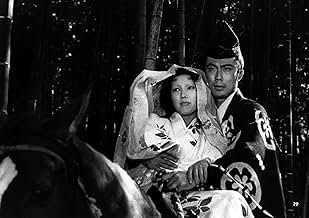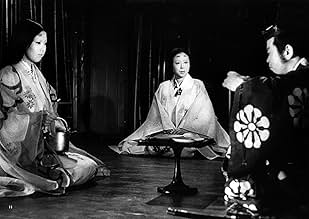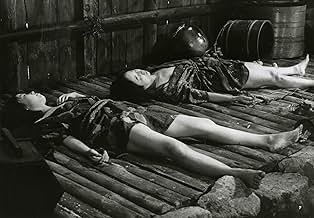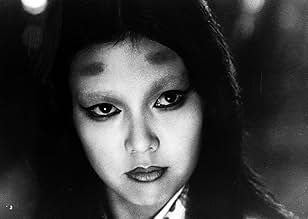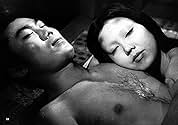IMDb RATING
7.7/10
9.4K
YOUR RATING
Two women are raped and killed by samurai soldiers. Soon they reappear as vengeful ghosts who seduce and brutally murder the passing samurai.Two women are raped and killed by samurai soldiers. Soon they reappear as vengeful ghosts who seduce and brutally murder the passing samurai.Two women are raped and killed by samurai soldiers. Soon they reappear as vengeful ghosts who seduce and brutally murder the passing samurai.
- Awards
- 2 wins total
- Director
- Writer
- All cast & crew
- Production, box office & more at IMDbPro
Featured reviews
Shot in black and white, this film has some unique imagery to accompany the creepy haunting.
Very much in the style of Kwaidan and other Japanese supernatural films of the 1960's. And very much a traditional Japanese ghost story where ghosts and evil spirits inhabit a world of logic alien to the real world. Western ghosts stories usually have the spirits think as living people do. Japanese spirits behave in bizarre ways that are much more disturbing.
The film follows the two spirits of a murdered wife and mother-in-law as they proceed to kill and drink the blood of any samurai that passes their neighborhood. The film, while very well made, is slightly routine at this point. When the husband returns a war hero, the film becomes poetic as he is assigned the task of eliminating the "monster" that is killing samurai. His encounters with his now demonic wife and mother comprise the rest of the film.
A truly excellent film. Any fan of the new Japanese horror films should see where they come from.
Very much in the style of Kwaidan and other Japanese supernatural films of the 1960's. And very much a traditional Japanese ghost story where ghosts and evil spirits inhabit a world of logic alien to the real world. Western ghosts stories usually have the spirits think as living people do. Japanese spirits behave in bizarre ways that are much more disturbing.
The film follows the two spirits of a murdered wife and mother-in-law as they proceed to kill and drink the blood of any samurai that passes their neighborhood. The film, while very well made, is slightly routine at this point. When the husband returns a war hero, the film becomes poetic as he is assigned the task of eliminating the "monster" that is killing samurai. His encounters with his now demonic wife and mother comprise the rest of the film.
A truly excellent film. Any fan of the new Japanese horror films should see where they come from.
Director Kaneto Shindô is most famous for his 1964 ghost story Onibaba; and anyone that enjoyed that film will certainly enjoy this one. The two films are very similar in style, and that's a good thing for both as the thick and surreal atmosphere created by the director creates a perfect atmosphere for a horror story to take place in. The title of the film translates in English to 'The Black Cat' - a staple of the horror genre ever since Edgar Allen Poe penned his classic story; although this film has nothing to do with the writings of Poe and is an original story written by the director. The film takes place in feudal Japan and our focus is on a mother and daughter-in-law living alone in the swamp. Its war time and all the samurais are out fighting. However, one day a group of them happen on the pair and after eating their food, the samurai's rape the women. Shortly thereafter, many samurai are being found dead in the area; they are drained of blood with their throats ripped out. Naturally the lord of the land comes to the conclusion that a monster is behind it, and sends a young hero to deal with the problem.
Kaneto Shindô is keen to fill his film with rich symbolism and striking visuals; but also finds time for some visceral horror. The opening scenes are shocking and later the films builds into some truly memorable and surreal sequences that, when combined with the atmosphere, do manage to be quite frightening. The swamp location is a really great place for the film to take place also; and the director makes the best of it, especially during the parts in which the younger of the two women is leading the stray samurai's to their death. The film is more than just the central story; and we also follow things going on around it; such as the eventual hero's fight that earned him the right to seek out and kill the demons. The central story is definitely the most interesting, however, and while the sub plots are not boring; I did mostly find myself waiting for the film to get back on track. The way that the story builds into the end, which really brings all the stray subplots together, is really good and the film ends on a very strong note. Overall, The Black Cat is not quite as great as the director's masterpiece Onibaba; but it's certainly a very good horror film.
Kaneto Shindô is keen to fill his film with rich symbolism and striking visuals; but also finds time for some visceral horror. The opening scenes are shocking and later the films builds into some truly memorable and surreal sequences that, when combined with the atmosphere, do manage to be quite frightening. The swamp location is a really great place for the film to take place also; and the director makes the best of it, especially during the parts in which the younger of the two women is leading the stray samurai's to their death. The film is more than just the central story; and we also follow things going on around it; such as the eventual hero's fight that earned him the right to seek out and kill the demons. The central story is definitely the most interesting, however, and while the sub plots are not boring; I did mostly find myself waiting for the film to get back on track. The way that the story builds into the end, which really brings all the stray subplots together, is really good and the film ends on a very strong note. Overall, The Black Cat is not quite as great as the director's masterpiece Onibaba; but it's certainly a very good horror film.
This is the best ghost movie I have ever seen, and highly unusual. It has gorgeous black and white cinematography, an exotic Japanese feudal setting, and a wide variety of visual and emotional effects. The characters move with the ritual formality that I love in certain Japanese films, and the story moves on with the ruthless intensity of a Noh drama.
The final scene is thrilling. The cinematic supernatural effects are sparingly used and startling.
The final scene is thrilling. The cinematic supernatural effects are sparingly used and startling.
Very similar to Shindo's masterpiece "Onibaba". A mother and daughter-in-law seek vengeance on the samurai class for the suffering they have been put through. Female spirits luring lustful men to their doom is a very common theme in Japanese ghost stories ie. Ugetsu, Kaidan, etc. In this tale there is the added conflict when the son/husband is sent to destroy them. Very well done and very creepy.
THE SYNOPSIS In warring feudal Japan, a group of marauding Samurai seeking food exits the forest where they come across a house that should have what they require. On entering the house they find it has what they want and a lot more
.it has women too. The inhabitants an elderly woman and her daughter in law are both subjected to continuous rape as each Samurai takes their turn, the others plunder the women's food stocks.After the Samurai have satiated their appetites,they leave the women, now unconscious for dead and set fire to their home as they flee.When the fire eventually burns out all we see are the burned and battered bodies of the women and their helpless black kitten as it licks their wounds.
Rajomon Gate .a Samurai approaches on horseback and is met by a spectral vision of a woman, who tells him she is too afraid to make her journey home because she has to pass the Bamboo Grove, which is a haven for bandits and highwaymen. The Samurai agrees to accompany her to her home, where he is plied with sake. The Daughter in laws husband Hachi, we learn has been at war for three years and has still not returned The daughter in law then proceeds to seduce the Samurai, before she brutally attacks him, devouring his throat and sucking his blood ..for we learn that the two women are in fact the newly embodied spirits of the dead women murdered by the Samurai who have made a pact with the Evil Gods/Spirits, who have allowed them life, on condition that they murder all Samurai who pass their way.
Far to the East, a sole warrior named Hachi is all that remains after a massive and bloody battle.Hachi returns home to find his home burned and his family missing, he seeks employment from the Samurai leader at Rajomon Gate named Raiko, who after hearing Hachi's brave stories takes him on. Hachi's first task is to rid the area of the spectral beasts that have been claiming the lives of his warriors ..and so Hachi sets off unknowingly to kill his own family.
THE REVIEW Unquestionably a companion piece to Onibaba, a film by the same Director it was made to cash in on the success of Onibaba which had been met by a wave of good criticism in the west .and also because Shindo's other contemporary works had been less critically received mainly due to their overtly sexual content. Kiyomi Kuroda's award winning cinematography sets the tone for this film, its Chiaroscuro/Noir visuals are nothing short of breathtaking. The underlying tragic story of lost love is also dealt with brilliantly by Shindo who is on fine form again .the story is compelling except for the first twenty minutes which became a bit repetitive as Samurai after Samurai was seduced and killed by the women, but this ploy was used to bring the story forward so I wont criticize too much.All in all, a worthwhile buy if you like Onibaba or Asian Cinema,but the DVD despite the films stunning print is very bare.
Rajomon Gate .a Samurai approaches on horseback and is met by a spectral vision of a woman, who tells him she is too afraid to make her journey home because she has to pass the Bamboo Grove, which is a haven for bandits and highwaymen. The Samurai agrees to accompany her to her home, where he is plied with sake. The Daughter in laws husband Hachi, we learn has been at war for three years and has still not returned The daughter in law then proceeds to seduce the Samurai, before she brutally attacks him, devouring his throat and sucking his blood ..for we learn that the two women are in fact the newly embodied spirits of the dead women murdered by the Samurai who have made a pact with the Evil Gods/Spirits, who have allowed them life, on condition that they murder all Samurai who pass their way.
Far to the East, a sole warrior named Hachi is all that remains after a massive and bloody battle.Hachi returns home to find his home burned and his family missing, he seeks employment from the Samurai leader at Rajomon Gate named Raiko, who after hearing Hachi's brave stories takes him on. Hachi's first task is to rid the area of the spectral beasts that have been claiming the lives of his warriors ..and so Hachi sets off unknowingly to kill his own family.
THE REVIEW Unquestionably a companion piece to Onibaba, a film by the same Director it was made to cash in on the success of Onibaba which had been met by a wave of good criticism in the west .and also because Shindo's other contemporary works had been less critically received mainly due to their overtly sexual content. Kiyomi Kuroda's award winning cinematography sets the tone for this film, its Chiaroscuro/Noir visuals are nothing short of breathtaking. The underlying tragic story of lost love is also dealt with brilliantly by Shindo who is on fine form again .the story is compelling except for the first twenty minutes which became a bit repetitive as Samurai after Samurai was seduced and killed by the women, but this ploy was used to bring the story forward so I wont criticize too much.All in all, a worthwhile buy if you like Onibaba or Asian Cinema,but the DVD despite the films stunning print is very bare.
Did you know
- TriviaThe movie was placed in competition at the 1968 Cannes Film Festival, but the festival was canceled due to the civil unrest events of May 1968 in France.
- GoofsWhen the cat crawls over the bodies after the fire, the mother can be seen to breathe.
- ConnectionsFeatured in Ebert Presents: At the Movies: Episode #2.15 (2011)
- How long is Black Cat?Powered by Alexa
Details
- Release date
- Country of origin
- Language
- Also known as
- Kuroneko, el grito del sexo
- Production company
- See more company credits at IMDbPro
- Runtime1 hour 39 minutes
- Color
- Aspect ratio
- 2.35 : 1
Contribute to this page
Suggest an edit or add missing content



